Deciphering individual behaviour pattern by using big data analytics is believed to be subtly ushering in a more efficient paradigm for companies-customers engagement. Analysts claim it could also significantly aid the hospitality industry which is battling against OTAs and new age aggregators to save its sales turf.
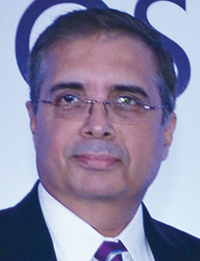
President, american express india
What is happening in the technological space could well be considered as a miniatured expression of that big bang theory which many believe led to the creation of the universe. The explosive emergence of big data analytics in the recent years, mostly recognised by the growing prowess of cloud computing and internet of things, is slated to change the interaction pattern of all kinds including business allowing companies cutting across all spectrums to understand their customers better. Almost on a personalised basis in a micro-sense. While hoi polloi would be quite oblivious to this trend, billions of social site subscribers or individual broadcasters (as facebook, linkedin, or twitter would like to call them) are being analysed on the basis of their mundane postings everyday. The broader objective is to understand their preferences and choices as consumers and this information is used by the companies to enhance their engagements with the end-users of their products. And this is a trend which is going to grow much stronger with the increasing penetration of the internet on the planet.
A dedicated session at the recently held Global Hospitality Conclave saw senior representatives of global tech leaders explaining to the hospitality fraternity the immense benefits of adopting big data analytics not only in retaining their customers base but also for expanding it. “At a time when the hospitality industry is battling with the OTAs and new age smart aggregators, leaning on big data analytics would be inevitable,” that appeared out to be the central message.
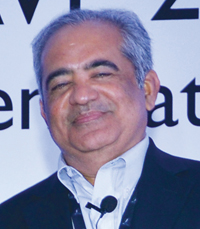
Cornell school of administration
“If oil was the fuel for the industrial revolution, then big data is the fuel for information revolution. It is a game-changer which among other things will also change our business engagement processes forever,” Dr. Chekitan S Dev of Cornell School of Hotel Administration set the tone of the session with these words. He further substantiated his opening remarks by underlining that more data has been generated in the last two decades than in the entire history of the mankind.
For a marketplace like India where e-commerce boom has been the most defining trend in the recent years, big data analytics as a business process has begun picking up momentum. According to an estimate, the annual business amounts to over $3 billion growing at a hefty 35 percent plus rate. For the top notch global firms, either from the tech or merchant sides, the business is shaping up as a defining platform which will become the all-pervasive base. “Big data is anything but a fab. It has given us a big information leap. What was done in a year is now accomplished in a few hours. Mapping each customer’s preferences put us as well as our merchants in an advantageous situation,” Sanjay Rishi, President, American Express India pointed out. According to him, the growing influence of big data analytics is also a major contributory factor in fuelling the online transaction growth all across the planet in a big way – last year it amounted to 6.7 billion transactions resulting in a staggering $1 trillion worth of business. Dr. Sukanyya Misra, SVP & Group Head, MasterCard Advisors explained the broader contours of big data which is making it a lethal tool to shore up businesses of all kinds. “Earlier we used to deal only with transaction data. But big data has leaped into multiple sources. Now on platforms like Facebook, subscribers are giving all kinds of information. And using social information for product customisation has become a major trend. There are 2.6 billion internet of things devices installed globally. Life is simply changing big time because of big data power,” she said.
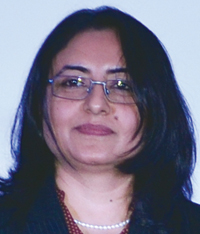
SVP & Group Head,
MasterCard Advisors
Dr. Bhaskar Pramanik. Chairman, Microsoft India explained another dimension of the benefits of big data analytics – something that is critical to all businesses. “Forecast plays a major role in any business and in the past, we have been doing it on the basis of Customer Relationship Management (CRM) system. But now it is getting replaced by big data because it can be more accurate. Companies like ours are working on improving the accuracy quotient of big data. It will usher in a major change.” The phenomenal emergence of sites like Facebook (it is getting 1 billion hits everyday) is resulting in this revolution which will make big data adaptability inevitable for all forward looking companies. “About 500 TB of data is generated every 10 minutes on the planet. This is a huge resource base which provides everybody the opportunity to scale up personalised marketing in a major way. Consumers are telling you what they like. It is for the businesses to understand these messages and make the most of them in engaging their customers,” Prasanjeet Baruah, Business Head (Tech-Telco and New Business), Facebook opined.
The moot point now is: how can big data make a big change in the hospitality business? Especially at a time, when OTAs and new age online aggregators have begun wielding considerable clout when it comes to actual sales. “Today, online companies like expedia are making more money on your fixed assets. They can take forward looking calls pertaining to your business more quickly,” Dr. Pramanik of Microsoft India presented the crux of the issue in these words.
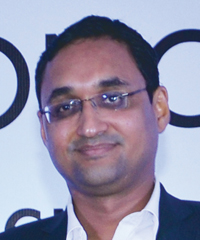
Business Head (Tech-Telco and New
Business), Facebook
However, the leaders in the technology space share a common belief that with adoption of digitised processes and big data analytics, hotels can still have a major control in their interaction with customers. “Platforms like Facebook can tell you the new set of customers whom you can target and make offers. They are helping us a lot in new customer acquisition exercise. My company is working very actively with Facebook and Linked for this and I don’t see any reason why hospitality companies can’t do the same,” said Sanjay Rishi. He further added myriads of specific benefits which big data analytics can provide to the hospitality industry. “The big data power can be used to elicit a host of business centric information. It can tell you the best locations for future projects, locations where you are under-indexed vis-à-vis your peers, share of different class of travellers and even the business trends of your competitors.” “In the hospitality business, everybody is looking to deliver differentiated experience. Big data analytics understand this and it can figure out what kind of services you need to provide to your customers. It can even go to the extent of making anykind of processing, invoicing to collection, completely unmanned,” Dr. Pramanik of Microsoft India added.
According to Dr. Sukanya Misra of MasterCard, some section of Indian hospitality has begun aligning with big data power and this trend is slated to grow manifold. “For a hotel in tier 2 city, using big data analytics we found out that 98 percent of their business is coming from locals. To shrink this percentage and get more revenue from the outsiders, we gave them a set of advise based on our big data findings including the specific platforms they should choose to advertise. And it has worked for them. Big data simply helps in taking smart decisions and Indian hospitality will definitely lap to it more aggressively in the future,” she opined.
“Hospitality industry can still make a comeback”
According to Bhaskar Pramanik, Chairman, Microsoft India, hospitality industry can still put up an effective fight to the OTAs threat by adopting smart technological applications. Excerpts of a brief conversation:
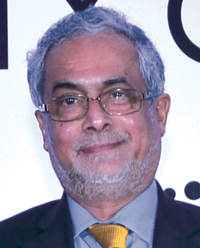
Chairman, Microsoft india
A popular view pertaining to hospitality business is that the players holding these large fixed assets have lost the game to the OTAs and new age aggregators, when it comes to sales. Why do you think it happened in the first place?
They faltered on this front because somewhere they could not anticipate the fast moves made by platforms like Expedia. These platforms have subtly developed greater influence with people who make online bookings. And the number of online subscribers has significantly grown. But I don’t think, it is too late for them yet. They can still make a comeback. They can still learn to use technology to reach and engage their customers more efficiently.
Do you really feel that getting back is a strong possibility? There is a strong section which believes that things have gone out of their hand.
A higher degree of adoption of technological processes will play a major role. The current model which they have is largely not aligned with smart technology. The hospitality industry, by and large, has been based on the brick and mortar, real estate model. The point in favour of hotels is that at the end of the day, customers are looking for an experience which only hotels can provide. Using technology options which are available today, they can find ways and means to approach customers directly.
What is Microsoft doing in terms of helping the hospitality industry with new age, smart solutions? You know their basic challenges.
We are trying to help them out on several fronts with solutions - social, mobility, analytics, using the power of the cloud, etc. Our solutions can help them in reducing the cost of their operations and become more customer friendly.
Do you think, Indian hospitality industry is really rising to the fact that they need to transform their attitude vis-à-vis the use of technology?
I think they are recognising this. The writing is on the wall: if they don’t do it, they will face problems in engaging their customers.
So you are optimistic in the sense that technological solutions are readily available and players in the hospitality domain will leverage them more aggressively?
In any traditional industry, everybody has to reinvent themselves at some stage, whether it is banks, government, education sector, etc. It is a commonplace knowledge that technology is changing everything. It is for this reason that I am optimistic for the hospitality industry. If it does not happen, it could well become detrimental for their survival.
No breach of privacy, assures tech leaders
When out of the sheer urge to share your experience of a holiday well spent (with your friends and family members) you post the pictures on a social site, the chances are it is eventually turning out to be much more than just being a joy sharing exercise confined to a small group. There is a set of back-end devices and processes deployed by the players in the data analytics who would be probably reading more than what you would imagine your posting to transmit. These postings could well reflect your preferences and choices – a future opportunity for all service providers who could respond to those specific aspirations. And then they could well try to reach out to you in myriads of ways. Pictures of a holiday is just a small example. The urge to better understand the consumer in you is gradually becoming an all-encompassing exercise now including all activities which you may be sharing on a social platform.
As the big data analytics spread its wings in a marketplace which is becoming increasingly competitive, the debate pertaining to breach in privacy is also growing in decibel. Afterall, consumers as leading actors in the play (its all about catching them), are not exactly aware of behind the stage happenings. The increasing commoditization of individual consumers is the main rankling point for some observers. The representatives of global tech players as well as industries which are aligning with big data analytics, however, refute the charges that they are leaving loose ends in the process. “We are a responsible company. We never cookie anybody without their consent. We only share generic consumer behavioural pattern with the merchants in our loop,” Sanjay Rishi of American Express pointed out. Prasanjeet Baruah of Facebook was equally assertive in his claim that personal information shared with the platform is not liable to be passed on to any company. “ We only talk about a cluster of people who look similar in their preferences and choices. No personal information is ever compromised,” he said. According to Dr. Sukanya Misra of MasterCard, no responsible player in the value chain would ever indulge in this since it could tarnish its reputation. “We are governed by data security laws which are very stringent in nature. Nobody in his right mind would tend to fall on the wrong side of the law.”